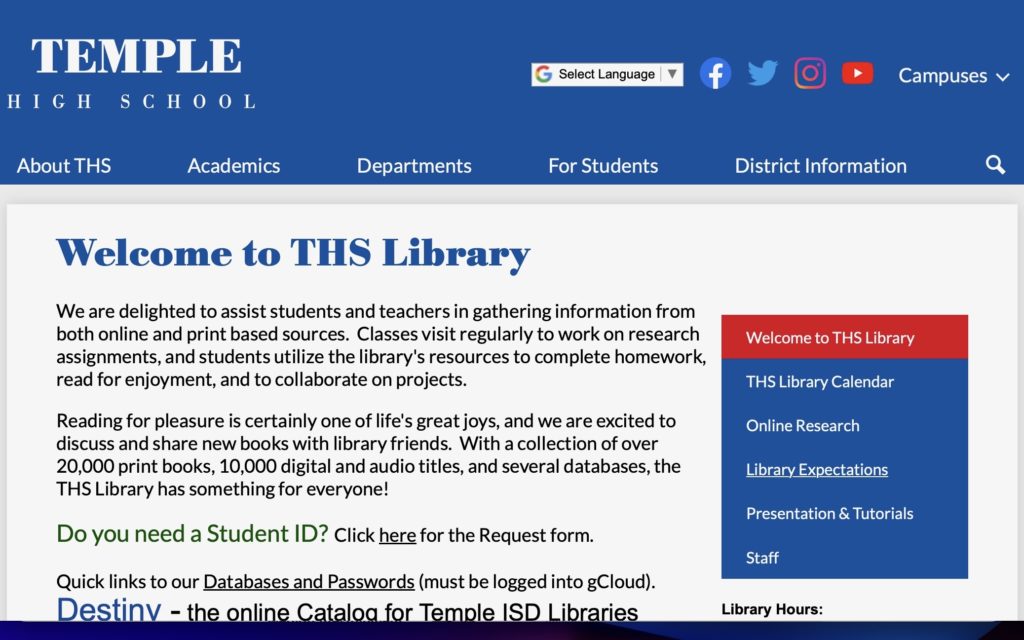Temple ISD Highlights Challenges in Library Book Transparency
 With a federal judge having blocked a new state law regulating the use of sexually explicit books in public schools, parental (and other interested party) supervision will continue as the front line defense in monitoring sexually explicit content to which Texas school children are exposed.
With a federal judge having blocked a new state law regulating the use of sexually explicit books in public schools, parental (and other interested party) supervision will continue as the front line defense in monitoring sexually explicit content to which Texas school children are exposed.
House Bill 900, also known as the READER (Restricting Explicit and Adult-Designated Educational Resources) Act, was set to take effect Sept. 1 and would have restricted the inclusion by libraries of harmful material and other sexual or patently offensive content as described in the Texas Penal Code. Vendors were to be responsible for rating and appropriately labeling the books.
As culture wars occupy significant space in today’s (by design) conflict laden world, a three-part series (Bell County: What’s in Your Public School Library? Part One, Part Two and Part Three) lays out the general issue of exposing children to sexually provocative materials.
With this, it’s important to understand the explicit book issue and until the current injunction is further litigated, it’s critical that non-education industry individuals remain vigilant regarding content in their local school libraries and classrooms.
Understanding the playing field
In seeking to monitor K-12 schoolbook offerings, understanding the culture of today’s public education industry is key.
Texas Scorecard’s Exposed: The Dark Side of Texas Schools podcast discusses “how school districts react when facing criticism” – or for our purposes, the potential for criticism.
Dr. Kris Kittle, a parent activist with a Ph. D. in higher education, describes how “in talking with school administrators, protecting the school district and their jobs seems more important than protecting students.”
“It would appear to me that the administrators are always going to protect the machine,” she said. “Like the job of the administration is to protect the machine of the district meaning that the district – the entity of the district – is what they want to protect and they will protect that at all costs.”
“I don’t even think that they care about protecting the employees,” she continued. “They just care about protecting the reputation of the district, that’s their number one goal at whatever cost.
“Now is that an intentional goal? I don’t think so. I think it’s just by their actions, that’s what they do.”
Auditing your school
Researching the book collections in your local school can seem a daunting task, but it’s nothing that can’t be overcome with some time and perseverance.
As a resident of Bell County, a project to determine the degree of explicit books in our local school libraries was undertaken. With that, the offerings of seven districts – Academy, Belton, Copperas Cove, Killeen, Salado, Temple and Troy ISDs – were examined in the above-mentioned series.
The exercise provided interesting insight as to the availability of explicit books as well as to the attitudes and cooperation of school officials when seeking this information.
Online resources
Destiny Discover is an helpful resource for a library book review. After entering your state, district and school name, specific book titles can be inserted along with a variety of other searchable options. Of course, the value of any database is always contingent on how well it’s kept current, but the site certainly assisted with the Bell County project.
While specific districts can be password protected, six of the seven sites we searched allowed public access. Temple ISD was our only district with restricted access.
BookLooks.org offers additional information on questionable books. While not connected to school collections, it does rate the graphic and sexually explicit content that specific titles contain.
These two sites are helpful resources for the identification and evaluation of sexually explicit books.
The outlier
Temple ISD was the outlier when it came to library information accessibility. The experience in gaining access to the Temple library catalog, however, offers instructive opportunities for others who may come across similar obstacles.
In a 2021 article entitled Reflecting community: Temple ISD says it chooses books based on ‘conservative values’, Deputy Superintendent of Academics and School Leadership Lisa Adams told the Temple Daily Telegram that books added to the district’s curriculum are “spurred by district staff and not ‘outside entities.’”
“We have a procedure where we utilize a committee approach if a teacher nominates a book or novel to be read in class,” she told the Telegram. “It’s a broad range of folks within our school district … and usually consists of administrators, teachers and instructional coaches.”
The thorough vetting process works, she said, noting the absence of removal requests from the community.
“I haven’t had any parents express that they want us to remove a book. That’s not common for us,” Adams said. “I think we do a really good job of vetting books, and making sure that they’re appropriate and age-level appropriate.”
She further noted how “educators — which serve on the committee on a rotating basis — are tasked with determining whether the text aligns with Temple ISD’s policies and ‘conservative values.’”
In May testimony before the House Public Education Committee, Temple ISD Superintendent Bobby Ott testified for “fully funded” public schools and against education savings accounts that offer parents a wider choice of educational opportunities for their children.
Citing transparency and accountability as key components of parent empowerment, Ott noted:
Parents are the ultimate judge, but when it comes to spending taxpayer money there must be transparency and accountability for all taxpayers, not just parents of school children. There are many citizens that pay taxes and do not have children in school; and they still want to know how their money is spent.
Months later he additionally championed the need for transparency when discussing the district’s participation with other schools in challenging the new Texas public school accountability system:
Although educators are not unfamiliar to the idea of standards changing — as Texas has replaced its statewide assessment several times over the past three decades — Temple ISD Superintendent Bobby Ott stressed how a lack of transparency with educators and a rushed timeline for its implementation has worried him and his peers.
Ott’s comments are especially notable with having being named 2022 Superintendent of the Year by the Texas Association of School Boards, a distinction that positions both him and Temple ISD as models for educational performance.
Transparency and accountability indeed are key. In a dog vs. tail wagging analogy, taxpayers (those funding the schools including parents, community members, property owners and other concerned parties) should be the dog and government entities (school districts receiving said funds) the tail. But as in this case, that theory and reality too often seem at odds.
When opaque is the new transparency
Upon first investigating access the Temple ISD library database in May 2023, the school website issued this invitation:

Through an online submission portal, the following was requested:
As a community member, please let me know next steps for accessing the Temple ISD library catalog.
A response from Destiny Manager for Temple ISD Library Services Kathy Silva promptly informed how “the District only allows current students to access the District’s library databases through that link” and that questions or concerns should be addressed to the District’s public information office.
With that, a public information request seeking “access to Temple ISD’s K-12 current library catalog(s) be it in digital or other updated format” was submitted. Note that the Freedom of Information Foundation of Texas offers great public information resources including these useful letter templates.
A response six days later (May 24) from Public Information Officer Jon Wallin informed that “the District needs clarification to respond to your request” and asked would “a scanned pdf of the contents of the library catalog suffice?”
“To answer your question, since the district is electing to deny online access to the library catalog, a scanned pdf of the K-12 current library catalog(s) will evidently have to do,” was the response submitted one day later and on June 5, a 5,313-page PDF of the Temple ISD library catalog was received.
While legitimate clarifications can arise, potential PIO submitters should be aware that school districts and other government entities may consider oversight efforts seeking transparency as actions of “uncivil discourse,” a concept highlighted at txEDCON21, the annual conference of the Texas Association of School Administrators and Texas Association of School Boards.
Actions speaking louder than words
Important takeaways of the TISD interactions include that the district’s PDF provided insight as to the sexually explicit books available at the time of the PDF’s receipt, but preclude any ongoing monitoring. Also, the district has now revised its high school library website:

Note that while the May version espoused delight to assist “students, teachers, and community members,” the text has been revised with “community members” having now been deleted.
But the website’s wording doesn’t really matter. Removing text does not change the incumbency – the duty – of transparency and accountability that any governmental entity has to constituents or any other taxpayer.
It’s fine to champion transparency before legislative hearings and in the media, but the real test is how it’s practiced with regard to constituents. And in this case, scrutiny of library offerings did yield noteworthy titles as detailed in Bell County: What’s in Your Public School Library? Part Three
And remember, this is a school district with leadership acknowledged as exemplary, a model for our 1,200+ districts. With that, this action serves to remind that other Texas school districts may also not embrace community members’ expectations of transparency.
Discrediting public education
It’s a common response as transparency can – not surprisingly – lead to scrutiny. Practically speaking though, cries of “discredit” often occur as realities of a given situation are exposed. And realities are sometimes unflattering, but that doesn’t mean they are untrue.
Additional resources
Parent and pro-family education advocate Christine Bentley is presenting “How to Audit School Libraries for Sexually Explicit, Pervasively Vulgar, and Educationally Unsuitable Materials.” workshops across the state.
The program features an HB 900 toolkit that includes an informational sheet and a list of more than 400 books that meet the recent legislation’s criteria for removal. It also includes a resolution that can be passed by a local Republican County Party. This resolution provides a directive to local school boards for the immediate removal of sexually explicit, pervasively vulgar and sexually explicit material.
This important resource can further maximize local activists’ time expense and effectiveness.
The READER Act’s passage was indeed a win for Texas parents and other concerned parties, but most importantly, it was a victory that will hopefully help secure a better, healthier future for Texas school children.
This, though, is no time to think “mission accomplished.” As vigilance regarding both current library offerings and a watchful eye of the bill’s new ratings system remains critical, don’t lose sight of the target. This issue continues to need and be worthy of attention.
Lou Ann Anderson is a writer, former radio producer and current podcaster at Political Pursuits. Her tenure as Watchdog Wire–Texas editor involved covering state news and coordinating the site’s citizen journalist network. As a past Policy Analyst with Americans for Prosperity–Texas, Lou Ann wrote and spoke on a variety of issues including the growing issue of probate abuse in which wills, trusts, guardianships and powers of attorney are used to loot assets from intended heirs or beneficiaries. She holds a degree from the University of North Texas in Denton.

